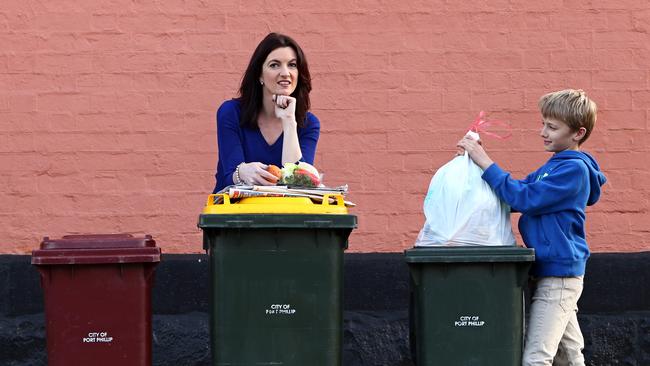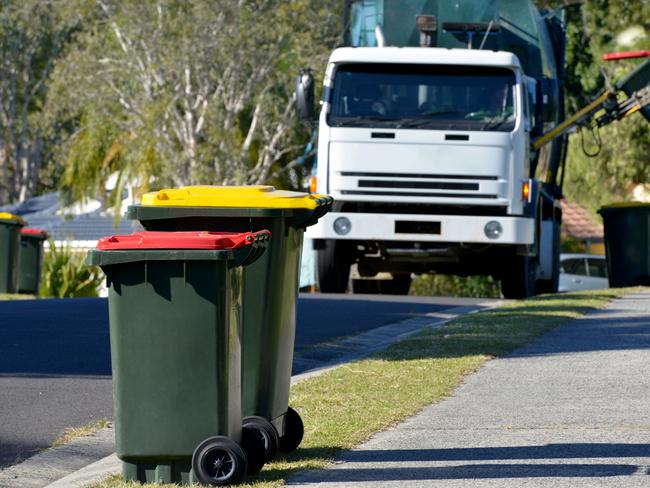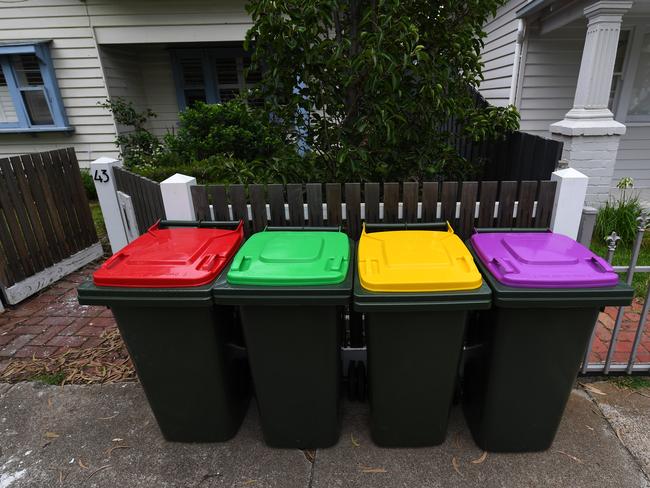Councils slugging ratepayers with annual waste charges, on top of rubbish rate rises
Victorian ratepayers are being hit with huge hikes in waste charges, raising concerns councils are circumventing the state’s general rate cap.

Victoria
Don't miss out on the headlines from Victoria. Followed categories will be added to My News.
Councils are slugging Victorians with sneaky new bin taxes of up to $179, and raising rubbish rates between 10 and 20 per cent, as the state continues to struggle with the ongoing landfill crisis.
Analysis by the Herald Sun has revealed that homeowners across the state are being hit with rising rubbish costs that in some cases amounts to hundreds of dollars a year.
Almost 60 per cent of councils, in both rural and Melbourne metropolitan areas, hiked waste charges by more than 5 per cent from July 1.
One in four increased costs by more than 10 per cent.
On top of rubbish rate rises, some councils also slugged ratepayers with new annual waste charges adding to the bill shock.

Councils defended the new costs as “difficult but necessary”.
However, ratepayer advocates feared local governments were stealthily circumventing the state’s general rate cap, which is currently limited to 3.5 per cent.
Council Watch president Kelvin Granger told the Herald Sun that some local governments appeared to be transferring costs out of their general operating expenses and the rubbish portfolios to justify huge increases in waste charges.
“Ratepayers are struggling as it is with the cost of living at the moment, and our position is that we want to see these rubbish charges capped,” Mr Granger said.
“We want to see the State Government step in and do that like they did for general council rates.”
But senior Andrews government minister Ben Carroll said councils’ rubbish rates were “really a matter for them”.
“The landfill levy is a really important mechanism to support councils in terms of research and development, sustainability, recycling, in terms of increasing rates for people rubbish is really a matter for local government areas,” the public transport minister said.
“What the councils do in terms of the rates and how they work with their rate payers is really matter for them.”

In May, the Mornington Peninsula Shire council voted to increase the waste service levy by 22.85 per cent, adding six new waste charges.
This included an extra $35 for domestic waste bin collections, and an additional $150 for green waste.
In the high country, the Alpine Shire introduced a new “full cost recovery” approach slapping “every resident” with “an increase in the general waste charge on their 2023/24 rates notice of $179”.
The cost of collecting 120L bins on the Bass Coast rose from $128.42 to $143 – up 11.35 per cent.
In Merri-Bek the standard households copped a rise of 7.5 per cent.
Monash ratepayers copped a 13 per cent increase in the form of a new bin levy, but Mayor Tina Samardzija said the cost was still well below other councils and amounted to only an extra $6 per household.
Just three councils kept rubbish rates the same or reduced them for 2023/24, including Frankston City Council.
Councils told the Herald Sun that the state government’s move to double the state’s landfill levy from $65.90 in 2020 to $125.90 – which has since risen to $129.27 a tonne – was a factor behind rising rubbish rates.
Dwindling space at Victorian tips, the China ban on taking offshore recycling and illegal dumping – which costs councils between $250,000 and $1 million per year – were also blamed.
Rubbish was not just causing hip pocket pain, for some residents, it’s also an eyesore.
In Bulla, the local tip has had a 25-metre pile of rubbish stored near the main road since faults within the dumping area were discovered in 2018.
Local call it the Mount Everest of Rubbish and regularly complain about it visually but also that it smells.

The Australian Recycling Corporation has had the job of remediating the area, which the Environmental Protection Agency confirmed was on track to be gone in 2024.
Peter Anderson, chief executive of the Victorian Waste Management Association said while rising costs were unwelcome, the reality was that Victorians should expect to see more issues at tips and the rising costs of rubbish collection bills to skyrocket in the coming years.
“The thing is we don’t understand scale, we can’t keep up with a lot of the waste that’s being produced,” he said.
“Until we figure out a way to deal with waste more seriously it’s something we are going to have to continue paying for.”




